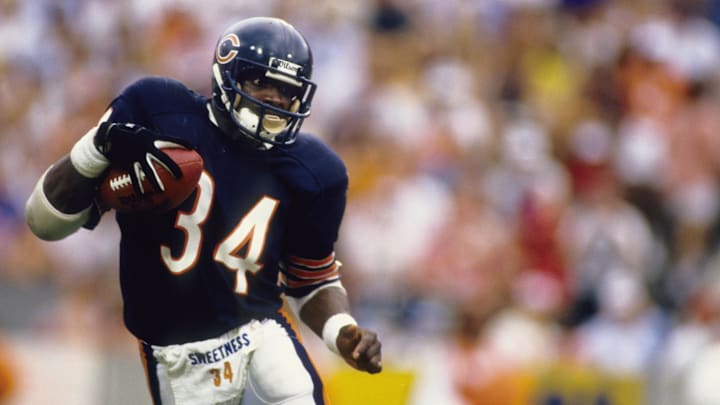
Walter Payton becomes NFC's top running back with Chicago Bears
During his rookie year, Payton quickly climbed up the team's depth chart, and halfway through the year, the Mississippi native was able to start the final seven games of the team's schedule. He finished his first season with nearly 900 total offensive yards and seven touchdowns and was able to lead the Bears in rushing yards.
By the following year, Payton's play as a rookie warranted him starting at the running back position, and the Chicago Bears offense surely got their use out of the standout back. From 1976 to 1979, Payton led the league in rushing attempts all four years, a testament to his toughness. In this early span of Payton's career, the Chicago Bears' record improved dramatically compared to the era before his arrival, and Sweetness was even able to help the team make two postseason appearances.
The best season of his career also came during this span in 1977, just his third NFL season. On the year, Payton totaled 1,852 rushing yards, 14 rushing touchdowns, 5.5 yards per rush, and 2,121 total offensive yards, all of which led the NFL during the year. At the completion of the regular season, the team made the postseason for the first time in 15 years, with Payton himself winning several accolades, including the league's MVP and the Offensive Player of the Year.
Even in the early parts of his career, Payton was a perennial Pro Bowler and All-Pro candidate. In his first five seasons as the team's lead back, Payton was nominated to both awards five times, only missing either team for the first time in 1980. From 1981 to 1982, Payton was only able to play in 25 total games due to a late-season injury in the later season, but even in a "down stretch" over his career, the superstar back totaled 2,500 total yards and nine total touchdowns.
Upon returning in good health for the 1983 season, the Chicago Bears as a whole began to scratch the surface of team greatness that deservedly belonged next to Payton's dominance. The running back was voted to his sixth career Pro Bowl at the end of the season with over 2,000 all-purpose yards, and the Bears finished the season with a .500 or better record for the first time in four seasons.
Unfortunately for Payton, by the time the team as a whole was prepared to compete for championships, the running back was already in the latter stages of his career. Sweetness's 1984 campaign saw him again reach over 2,000 all-purpose yards, and the Bears as a unit were able to make it to the NFC Championship. Despite Payton's 100 total offensive yards, the Bears' offense was shut out, ending the team's playoff run.
The following season, Payton was again able to post over 2,000 all-purpose yards for the third consecutive year and the fourth time in his career. Payton finished second in the league's MVP and Offensive Player of the Year award, but for the star player who had been plagued by middling teams throughout his career, Sweetness's focus, and that of the team in general, laid solely on earning the Lombardi Trophy.
